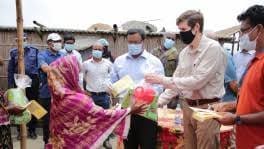The European Union and Germany have signed an agreement to provide €113 million (nearly 1,145 crore taka) in support to the Government of Bangladesh’s ‘Social Protection Programme for Unemployed and Distressed Workers in the RMG, Leathergoods and Footwear Industries.’ This will contribute to safeguard livelihoods of workers in export-oriented industries.
The programme, which is part of Team Europe’s contribution to fight COVID-19 and its consequences in Bangladesh, offers a safety net to workers whose livelihoods are affected by the economic fallout. It also contributes to strengthening the resilience of Bangladesh’s social security system.
The COVID-19 pandemic has created a public health emergency with immediate economic consequences. “The European Union and Germany are joining forces with the Government (of Bangladesh) to safeguard the livelihoods of vulnerable workers in the garment and leather export-oriented industries who are at a heightened risk of being pushed into poverty. This support will allow these workers to transit over a specific critical period, without major disruptions in their lives and consumption levels,” the EU External Action Service (EEAS) said in a statement.
“The COVID-19 pandemic has had detrimental consequences over the world and the poor are the first to bear the brunt of this crisis. Social protection is essential to protect people in situations of vulnerability, particularly when a crisis hits. By providing income support to workers in key export sectors who lost their job, at least temporarily, the social protection programme for unemployed and distressed workers responds to an immediate need to protect livelihoods. It is also part of longer-term efforts to establish sustainable social security mechanisms for workers, alongside continuous investments in skilling and job creation. In close coordination with our member states and like-minded partners, the EU remains committed to support the Government of Bangladesh to boost the resilience of its social protection system in line with best practices,” said EU Ambassador to Bangladesh Rensje Teerink.
The German Ambassador, Peter Fahrenholtz, added: “Germany’s contribution is part of our long-standing cooperation to support the workers in the textile industry in Bangladesh. During these difficult times, we are glad to join forces with the EU in order to help the Government of Bangladesh to mitigate the negative impacts of the COVID-19 pandemic on the livelihoods of textile workers.’’
The EU and Germany grant of €113 million will be channelled through the EU sector budget programme on National Social Security Strategy reforms in Bangladesh.

